 On Tuesday, the St. Louis Post-Dispatch published an OpEd by Cynthia Richards and Phillip Michaels of the non-partisan election integrity organization Missourians For Honest Elections.
On Tuesday, the St. Louis Post-Dispatch published an OpEd by Cynthia Richards and Phillip Michaels of the non-partisan election integrity organization Missourians For Honest Elections.
We don't normally do this, but since the entirety of the piece was so tremendously good; and, since it's so rare to see such an on-target OpEd on this topic in any major corporate news outlet; and, since St. Louis is our old hometown; and, since we've met with the MoHonest folks on a number of very pleasant occasions; and, since St. Louis County, the largest in MO, still shamefully uses 100% unverifiable Direct Recording Electronic (DRE, usually touch-screen) voting systems made by the oft-failed ES&S outfit in no small part because of this blog and this blogger's father; and, since the City of St. Louis still shamefully uses 100% unverifiable DRE systems made by Diebold; and, since much of the rest of the important "swing state" still shamefully uses similarly 100% unverifiable voting systems; and, since both fake "voting rights advocate" (really, top GOP vote suppression scam artist) Thor Hearne, and Bush's horrific U.S. Election Assistance Commission chair (now, Internet Voting huckster) Paul DeGregorio both live there and don't give a damn that voters in the state use such oft-failed, easily-manipulated, fully-unverfiable voting systems; and, since more people are likely to read the full article here than at the the Post; rather than just linking to the editorial, or quoting a few grafs, we're gonna run it in full below.
Please read it, and consider writing similar for your major newspaper in your hometown (and then watch them not publish it)...
By Cynthia Richards and Phillip Michaels
Originally published by the St. Louis Post-Dispatch
Tuesday, June 22, 2010
Missouri's county election directors go to considerable lengths to ensure the integrity of elections, hiring one staffer from both major parties to oversee critical points in the election process and putting double locks on rooms holding sensitive voting supplies.
These and other measures have been in place for decades because experience has taught that when power and money hang in the balance, the temptation for manipulating an election outcome is too great to rely on a "just trust us" approach.
However, since the purchase of direct-record touch-screen voting machines (called DREs) in 2006, these efforts at making elections transparent — and election results thereby believable — have been nullified.
Votes — particularly in populous areas such as St. Louis — now often are collected on DREs. There is nothing transparent about this voting method. The machine's software is secret; and contrary to what most voters believe, it is not reviewed by public officials at any level of government.
There is simply no way for anyone to know — without first making the assumption that the private software has functioned correctly — whether the ballot record in the machine's memory actually represents what the voter voted for on the screen. There is a paper tape record of the vote — an adding machine-type printed tape in a difficult-to-read window. However, because voters almost never check it, that provides no protection against fraud. Only a hand-marked paper ballot offers election authorities a reliable, software-free record of the voter's intent.
How worried should we be about the DREs' lack of a true audit capability? There have been many suspicious DRE software "irregularities" around the nation in the last four years that should give us pause.
The latest in the growing list of questionable results comes from the Democratic Senate primary election in South Carolina on June 8, which demonstrated the dangers of the "just trust us" approach to electronic voting using the same DREs that are used in St. Louis County (the ES&S iVotronic).
In that race, Alvin Greene, a candidate unknown to most South Carolina voters, garnered 59 percent of the primary vote, yet he ran no campaign, made no claim to any policy positions and opposed well-known former state legislator Vic Rawl, who actively campaigned and raised funds. In a race in which 86 percent of the mailed-in paper ballots favored Rawl, the unknown candidate Greene received 75 percent or more of the vote in many precincts statewide using the DREs. This is unprecedented — even for popular candidates.
Rawl has contested the results; however, in DREs, every record of the vote is under the control of the software. Therefore, as long as the software generates consistent records — even if inaccurate — election fraud is difficult to prove.
One might think that despite the potential for undetected fraud posed by DREs, at least they are cheaper than paper ballots. However, the cost of operating them is actually much more expensive than a paper-ballot system. St. Louis County's election expenditures in comparable years (two presidential elections) were $6.5 million in 2004 (without DREs) and $7.5 million in 2008 (with DREs), a 15 percent increase.
Although DREs do lower some costs, such as the cost of printing ballots, they aren't nearly enough to offset the costs of annual DRE software licensing fees, specialized programmers, support staff and required air-conditioned warehousing. Nor do DREs make voting quicker. A DRE may well be faster than a hand-marked paper ballot for a computer-literate voter, but when lines are long, as in a big turnout for a presidential elections, it's much quicker to hand out pens for marking paper ballots than to wait for additional voting machines to be delivered to the polls.
For the past two years, the non-partisan group Missourians for Honest Elections has promoted legislation to abandon DRE voting in Missouri, as many states have done. This year, the bill was introduced on the first day of the session and went to House Speaker Ron Richard for committee assignment. But, despite strong bipartisan support and calls from voters from around the state in favor of its passage, the speaker never assigned it to a committee.
One can only wonder why a bill that would help ensure the integrity of Missouri's elections, save money, as well as speed up the lines at the polls would be prevented from moving forward.
With Missouri facing August primary elections without the benefit of this much-needed legislation, election authorities should act on their own by choosing to conduct the upcoming elections with optically scanned hand-marked paper ballots, and reserving the DREs only for disabled voters who request them.
The continued practice of "just trust us" elections puts Missouri at risk of becoming the next South Carolina.
Cynthia Richards and Phillip Michaels are on the board of directors of Missourians for Honest Elections. Ms. Richards also serves as president.


 A Pretty Weak 'Strongman': 'BradCast' 10/30/25
A Pretty Weak 'Strongman': 'BradCast' 10/30/25 'Green News Report' 10/30/25
'Green News Report' 10/30/25
 Proposal for 'First Politically Viable Wealth Tax' Takes Shape in CA: 'BradCast' 10/29/25
Proposal for 'First Politically Viable Wealth Tax' Takes Shape in CA: 'BradCast' 10/29/25 Monster Storm, Endless Wars, Gamed Elections:
Monster Storm, Endless Wars, Gamed Elections: 'Green News Report' 10/28/25
'Green News Report' 10/28/25 Let's Play 'Who Wants
Let's Play 'Who Wants Sunday 'Cartoonists Dilemma' Toons
Sunday 'Cartoonists Dilemma' Toons Exiled NOAA Scientists Resurrect Critical Disaster Database: 'BradCast' 10/23/25
Exiled NOAA Scientists Resurrect Critical Disaster Database: 'BradCast' 10/23/25  'Green News Report' 10/23/25
'Green News Report' 10/23/25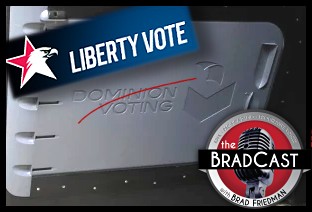 Trump-Allied GOP Partisan Buys Dominion Voting Systems: 'BradCast' 10/22/25
Trump-Allied GOP Partisan Buys Dominion Voting Systems: 'BradCast' 10/22/25 Trump, Republican Law(lessness) & (Dis)Order: 'BradCast' 10/21/25
Trump, Republican Law(lessness) & (Dis)Order: 'BradCast' 10/21/25 'Green News Report' 10/21/25
'Green News Report' 10/21/25 Celebrating 'No Kings': 'BradCast' 10/20/25
Celebrating 'No Kings': 'BradCast' 10/20/25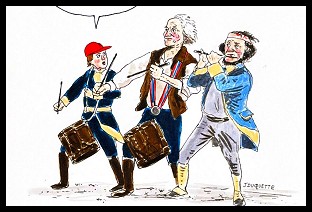 Sunday 'How It Started' Toons
Sunday 'How It Started' Toons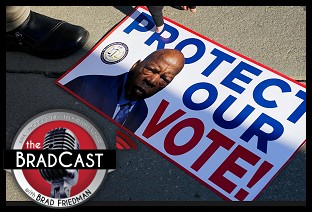 SCOTUS Repubs Appear Ready to Gut Rest of Voting Rights Act: 'BradCast' 10/16/25
SCOTUS Repubs Appear Ready to Gut Rest of Voting Rights Act: 'BradCast' 10/16/25 'Green News Report' 10/16/25
'Green News Report' 10/16/25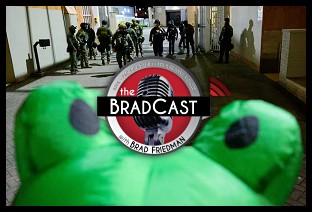 The 'Epstein Shutdown' and Other Autocratic Nightmares: 'BradCast' 10/15/25
The 'Epstein Shutdown' and Other Autocratic Nightmares: 'BradCast' 10/15/25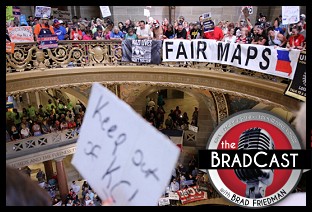 Group Vows to Block MO's GOP U.S. House Gerrymander: 'BradCast' 10/14/25
Group Vows to Block MO's GOP U.S. House Gerrymander: 'BradCast' 10/14/25 Trump Labor Dept. Warns Trump Policies Sparking Food Crisis: 'BradCast' 10/9/25
Trump Labor Dept. Warns Trump Policies Sparking Food Crisis: 'BradCast' 10/9/25 Trump's Losing Battles: 'BradCast' 10/8/25
Trump's Losing Battles: 'BradCast' 10/8/25 Trump, Roberts and His Stacked, Packed and Captured SCOTUS: 'BradCast' 10/7/25
Trump, Roberts and His Stacked, Packed and Captured SCOTUS: 'BradCast' 10/7/25 Trump Attempting His 'Invasion from Within': 'BradCast' 10/6/25
Trump Attempting His 'Invasion from Within': 'BradCast' 10/6/25 Biden Budget Expert: Mass Firings in Shutdown 'Illegal': 'BradCast' 10/2/25
Biden Budget Expert: Mass Firings in Shutdown 'Illegal': 'BradCast' 10/2/25 Why is DOJ Suing 'Blue' States for Their Voter Databases?: 'BradCast' 10/1/25
Why is DOJ Suing 'Blue' States for Their Voter Databases?: 'BradCast' 10/1/25
 VA GOP VOTER REG FRAUDSTER OFF HOOK
VA GOP VOTER REG FRAUDSTER OFF HOOK Criminal GOP Voter Registration Fraud Probe Expanding in VA
Criminal GOP Voter Registration Fraud Probe Expanding in VA DOJ PROBE SOUGHT AFTER VA ARREST
DOJ PROBE SOUGHT AFTER VA ARREST Arrest in VA: GOP Voter Reg Scandal Widens
Arrest in VA: GOP Voter Reg Scandal Widens ALL TOGETHER: ROVE, SPROUL, KOCHS, RNC
ALL TOGETHER: ROVE, SPROUL, KOCHS, RNC LATimes: RNC's 'Fired' Sproul Working for Repubs in 'as Many as 30 States'
LATimes: RNC's 'Fired' Sproul Working for Repubs in 'as Many as 30 States' 'Fired' Sproul Group 'Cloned', Still Working for Republicans in At Least 10 States
'Fired' Sproul Group 'Cloned', Still Working for Republicans in At Least 10 States FINALLY: FOX ON GOP REG FRAUD SCANDAL
FINALLY: FOX ON GOP REG FRAUD SCANDAL COLORADO FOLLOWS FLORIDA WITH GOP CRIMINAL INVESTIGATION
COLORADO FOLLOWS FLORIDA WITH GOP CRIMINAL INVESTIGATION CRIMINAL PROBE LAUNCHED INTO GOP VOTER REGISTRATION FRAUD SCANDAL IN FL
CRIMINAL PROBE LAUNCHED INTO GOP VOTER REGISTRATION FRAUD SCANDAL IN FL Brad Breaks PA Photo ID & GOP Registration Fraud Scandal News on Hartmann TV
Brad Breaks PA Photo ID & GOP Registration Fraud Scandal News on Hartmann TV  CAUGHT ON TAPE: COORDINATED NATIONWIDE GOP VOTER REG SCAM
CAUGHT ON TAPE: COORDINATED NATIONWIDE GOP VOTER REG SCAM CRIMINAL ELECTION FRAUD COMPLAINT FILED AGAINST GOP 'FRAUD' FIRM
CRIMINAL ELECTION FRAUD COMPLAINT FILED AGAINST GOP 'FRAUD' FIRM RICK SCOTT GETS ROLLED IN GOP REGISTRATION FRAUD SCANDAL
RICK SCOTT GETS ROLLED IN GOP REGISTRATION FRAUD SCANDAL VIDEO: Brad Breaks GOP Reg Fraud Scandal on Hartmann TV
VIDEO: Brad Breaks GOP Reg Fraud Scandal on Hartmann TV RNC FIRES NATIONAL VOTER REGISTRATION FIRM FOR FRAUD
RNC FIRES NATIONAL VOTER REGISTRATION FIRM FOR FRAUD EXCLUSIVE: Intvw w/ FL Official Who First Discovered GOP Reg Fraud
EXCLUSIVE: Intvw w/ FL Official Who First Discovered GOP Reg Fraud GOP REGISTRATION FRAUD FOUND IN FL
GOP REGISTRATION FRAUD FOUND IN FL

































